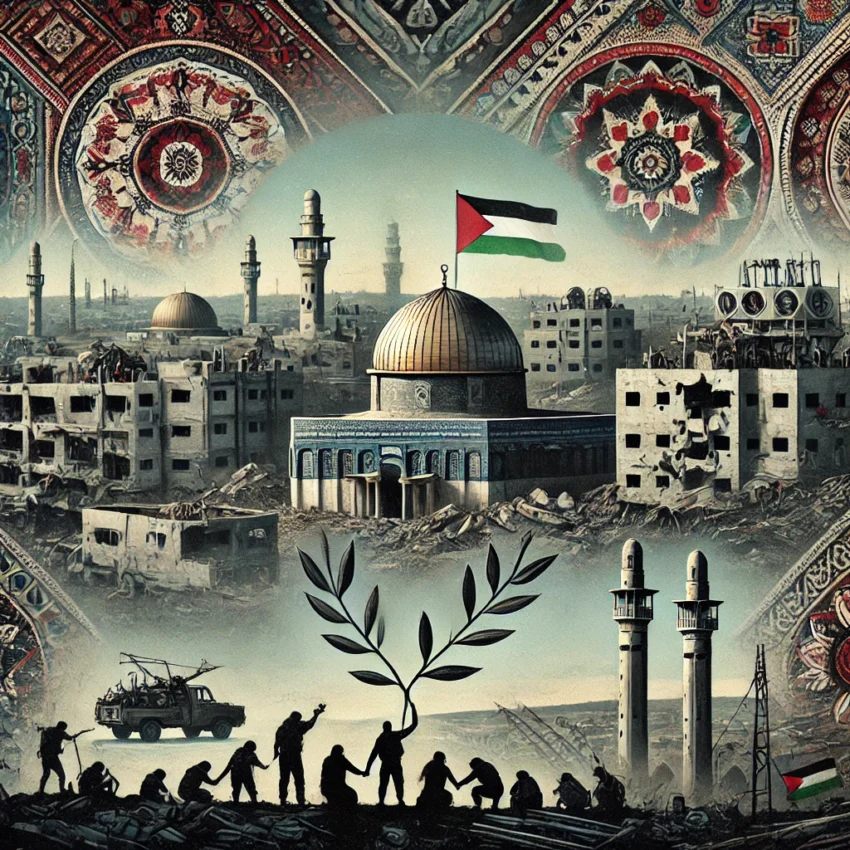Foundation and Early History
Hamas, or the Islamic Resistance Movement, was founded in December 1987 during the First Intifada, a Palestinian uprising against Israeli occupation of the West Bank and Gaza Strip. The organization emerged as an offshoot of the Egyptian Muslim Brotherhood, driven by the goal of establishing an Islamic state in the territory of historical Palestine. Its founding charter explicitly called for the destruction of Israel and the establishment of an Islamic state.
Ideology and Values
Hamas combines Palestinian nationalism with Islamic fundamentalism. Its charter, published in 1988, outlines its ideology, which includes:
- The liberation of Palestine through jihad (holy war).
- The establishment of an Islamic state in all of Palestine.
- Opposition to any peace agreements or negotiations with Israel.
The organization’s values are rooted in a strict interpretation of Sunni Islam, with a focus on resistance against Israeli occupation and the use of armed struggle as a means to achieve their objectives.
Leadership
Hamas has had several key leaders since its inception:
- Sheikh Ahmed Yassin: The spiritual leader and founder, who played a central role in shaping the group’s ideology.
- Abdel Aziz al-Rantisi: Co-founder and political leader after Yassin’s assassination in 2004.
- Khaled Mashal: Leader of Hamas’ political bureau, known for his diplomatic efforts to garner support from Arab and Muslim countries.
- Ismail Haniyeh: Current political leader and former Prime Minister of the Hamas government in Gaza.
Hamas as a Terrorist Organization
Hamas is designated as a terrorist organization by several countries and international bodies, including the United States, the European Union, Canada, and Israel. The designation is based on:
- Violence and Terrorism: Hamas has conducted numerous attacks against Israeli civilians and military targets, including suicide bombings, rocket attacks, and tunnel infiltrations. These attacks have resulted in significant civilian casualties.
- Military Wing: The Izz ad-Din al-Qassam Brigades, the military wing of Hamas, is responsible for the majority of the group’s violent operations. It operates independently of the political leadership, often escalating conflicts without political oversight.
Oppression of the Palestinian Population
Hamas’ rule in Gaza has been marked by authoritarian control and human rights abuses:
- Political Repression: Hamas has suppressed political dissent, targeting members of rival factions such as Fatah. It has been accused of arbitrary arrests, torture, and extrajudicial killings of political opponents. Civilian manifestations have often been violently suppressed, with reports of killings and severe crackdowns.
- Women’s Rights: Women in Gaza face significant restrictions under Hamas rule, with strict enforcement of dress codes and limitations on their freedom. Violations of these rules have led to harsh punishments, including violence.
- LGBTQ+ Rights: Gay rights are severely oppressed in Gaza. Homosexuality is criminalized, and there have been reports of executions and severe punishments for those accused of being gay.
- Religious Freedom: Non-Muslims in Gaza face discrimination and oppression. Instances of violence against those practicing other religions have been reported, further limiting religious freedom in the region.
- Economic Hardship: The governance of Hamas has led to severe economic conditions in Gaza. Mismanagement, corruption, and the prioritization of military spending over civilian needs have exacerbated poverty and unemployment.
Misuse of International Funds
Hamas is known for diverting international aid funds intended for civilian relief towards military purposes and the personal enrichment of its leaders:
- Weapon Purchases: International funds have been redirected to buy weapons and military supplies instead of being used for humanitarian aid.
- Luxury for Leaders: There are reports that some Hamas leaders live in luxury while the general population suffers, indicating a significant misuse of funds meant to alleviate the plight of ordinary Gazans.
Recent Developments and Current Situation
The recent Israeli invasion of Gaza, triggered by escalations in violence, has brought significant attention to Hamas’ activities. The conflict has resulted in widespread destruction, high civilian casualties, and a humanitarian crisis in Gaza. Despite military setbacks, Hamas remains a significant force in Palestinian politics due to its control over Gaza and its network of social services that garner popular support.
Conclusion
Hamas has had a profound impact on the Israeli-Palestinian conflict through its combination of political activity and militant operations. Its designation as a terrorist organization is based on its extensive use of violence against civilians and military targets. Furthermore, its oppressive governance in Gaza highlights the complex challenges faced by Palestinians under its rule. The diversion of international funds and the suppression of fundamental rights underscore the detrimental effects of its rule. The future of Hamas and its role in the region remains uncertain, particularly in light of ongoing conflicts and geopolitical shifts.
With the end of Hamas, Palestine would have greater opportunities to grow and democratize.
Andrea Bodei
EUCIF
The European Cyber Intelligence Foundation is a European non-profit think tank specializing in intelligence and cybersecurity, offering consultancy services to government entities

